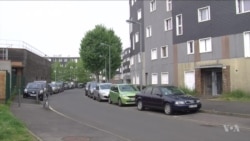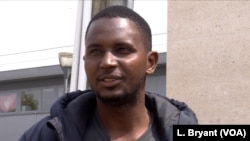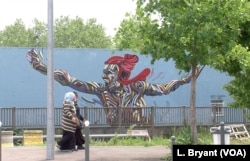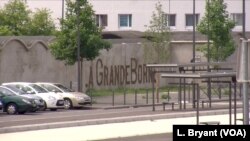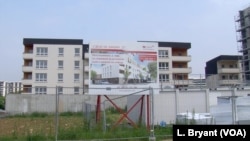Malian entrepreneur Hamad Bathily has faced many roadblocks trying to launch his career. After working as an illegal immigrant in New York City, he headed to the Republic of Congo to set up a struggling export business.His latest move, to the Paris suburb of Grigny, has brought yet another challenge: his address.
"Grigny is stigmatized by everyone," Bathily says. "Once people see 'Grigny' in their CV, they're wary."
Successive governments have tried to find solutions for Grigny and other disaffected banlieues, catchword for the high-immigrant, high-crime suburbs ringing Paris and other cities. Their existence amounts to a blatant challenge to the country's egalitarian creed. It also poses more practical economic and social challenges, including concerns about radical Islam.
Now, the burden lies with President Emmanuel Macron, who on Tuesday presents his banlieue proposals in a much-anticipated speech. But hopes for a grand battle plan have already been dashed. According to French media reports, Macron will present only modest measures, and largely bury an ambitious plan he commissioned.
In Grigny, about an hour's train ride south of the capital, residents are skeptical the man nicknamed "President of the Rich" can recast himself as president of the poor.
"I voted for Macron because I didn't have a choice," says mother of seven Foune Fofana, who like many here has African roots. "He needs to do things for the young, find them jobs, help neighborhood associations."
At the bottom
A bleak collection of housing projects crisscrossed by wide avenues, Grigny sits at the bottom of just about every development indicator. It is considered one of the poorest towns of France, with some of the highest rates of unemployment, school drop outs and illiteracy. Even the country's trademark bakeries and cafes are hard to find here.
"The French state has failed in policies it has instituted for years," says Grigny's Communist Mayor Philippe Rio, adding, "We have health problems that are unthinkable in France, where the health system is one of the best in the world."
Last October, Rio and 150 other banlieue mayors gathered here to launch "the call from Grigny," demanding action. They faulted spending cuts by Macron's government affecting vulnerable communities.
"We have the feeling authorities don't listen to us," Rio says. "That they mock us and throw crumbs our way."
Macron tapped a popular former minister, Jean-Louis Borloo, to come up with answers. But reports suggest Macron may only adopt some of Borloo's detailed proposals, which carry a hefty, $56 billion price tag.
"Emmanuel Macron wants to show he cares what happens on the other side of France, that he's not only the president of the cities, of the France that goes well," says analyst Bruno Cautres of Sciences Po University. But a real banlieue overhaul would demand huge investment "and I'm not sure that we can afford that," he adds.
Changing realities
Grigny's gritty reality contrasts sharply with the ideals of 1970s-era architects, who crafted utopian urban housing projects to house the French working class, and later the immigrants who flocked here in search of jobs. But as the years passed, the high rises and green spaces decayed into breeding grounds for drug dealing and crime.
In 2005, the banlieues exploded into rioting that spread countrywide. More violence followed, pitting angry youth against frustrated police.
A decade later, Grigny native Amedy Coulibaly attacked a kosher supermarket in Paris, killing four hostages before being shot dead by police. In a video, he claimed allegiance to Islamic State.
But community activist Aboubacar Sakanoko offers another face of Grigny.
"I'm from a town that's very closely knit," says Sakanoko, whose family immigrated from Senegal. "When I grew up, everybody brought up everybody's children. We were taught to be generous and help others."
Sakanoko has helped to launch a music festival in Grigny, along with a Web radio that showcases local artists.
He reflects a broader change afoot. Billboards sprout in weed-choked lots, soliciting buyers for upcoming apartment buildings. A new mosque has been built with funds raised by the local community.
Mayor Rio outlines plans to open a health center and nurture young talent. The town has launched training and education programs the Borloo plan hopes to replicate elsewhere.
"We have quickly considered ourselves as a laboratory," Rio said. "In an exceptional situation, we had to think differently, craft public policy and actions differently."
This story was originally published with an incorrect byline.




